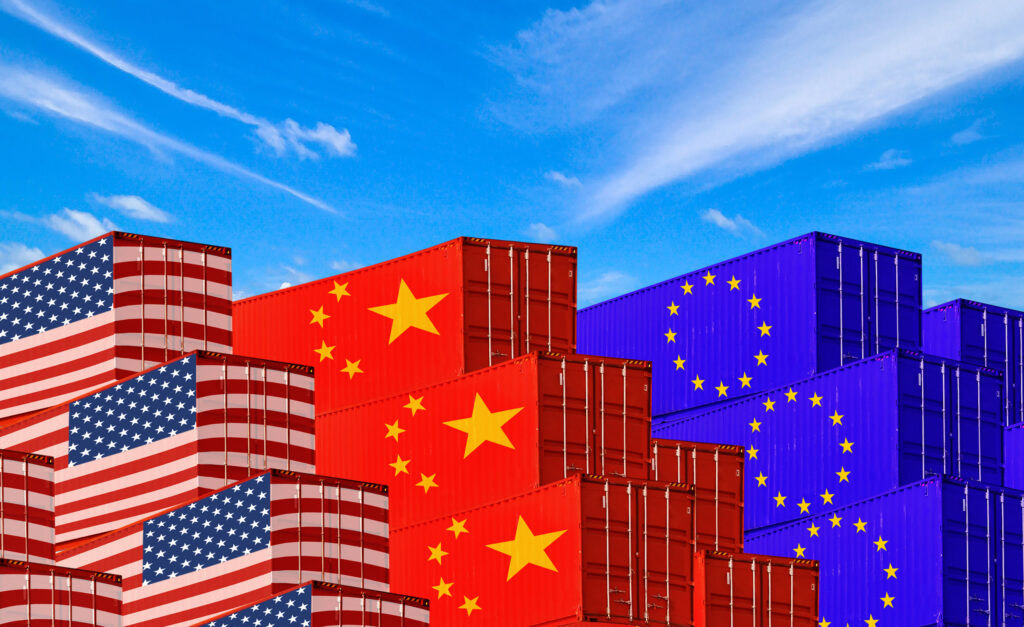- Web
- Feb 05, 2026
Trump threatens EU with tariffs amid trade deficit concerns
-

- Web Desk Karachi
- Dec 24, 2024

BERLIN: In a recent early morning social media post, U.S. President-elect Donald Trump issued a stern warning to the European Union: either remedy the substantial trade deficit with the U.S. through significant purchases of American oil and gas, or face widespread tariffs, reported FP.
This declaration reflects Trump’s ongoing frustration with Europe, as he has accused the EU of exploiting the US on trade and not adequately engaging with American products. Currently, Europe has only a month to negotiate a deal to avoid a full-fledged trade war, which could have severe implications if Trump is determined to rectify what he considers an unacceptable trade imbalance, totaling $131 billion in 2022.
To enable a constructive economic dialogue, Trump should seriously consider the proposals put forth by European Commission President Ursula von der Leyen. Ignoring these proposals risks initiating a trade conflict with Brussels, potentially empowering pro-Beijing sentiments in Europe.
Historically, European efforts to engage with the Trump administration have faced significant hurdles. In April 2018, French President Emmanuel Macron suggested a partnership to tackle mutual trade concerns related to China. Trump dismissed this notion, stating that the EU was “worse than China” and criticizing Germany’s automotive industry. A trade escalation was narrowly avoided a year later when then-Commission President Jean-Claude Juncker promised increased purchases of American soybeans and liquefied natural gas.
Under von der Leyen’s leadership, the European Commission has undertaken a record number of investigations into unfair trade practices by China, despite resistance from influential member states like Germany. Notably, von der Leyen pushed through tariffs against Chinese electric vehicle manufacturers, attempting to curb unfair competition.
In line with a growing reassessment of trade relations with China, the Commission has embraced a “de-risking” strategy that focuses on securing Europe’s economic and geopolitical interests amid China’s increasingly authoritarian stance. This involves assessing critical supply chain vulnerabilities and infrastructure risks while advocating for a European Economic Security Strategy.
Despite these advancements, the European response has been slow and inadequate in many areas. The Biden administration has expressed frustration over the reluctance of many European leaders to confront the security risks posed by Chinese companies, which have been implicated in supporting Russia’s military endeavours.
While the EU’s Economic Security Strategy mentions technology leakage, European leaders have been hesitant to align with US efforts to contain China’s military modernization through technology restrictions.
The need for Europe to engage more actively and decisively on technology and trade has never been more pressing. While aligning export controls on advanced semiconductor manufacturing has seen some backward movement, there remains a gap in fully addressing Huawei’s presence in critical 5G infrastructure. Germany, in particular, has shown a willingness to continue accommodating China’s industrial surplus, further complicating the EU’s position.
Trump’s administration faces a critical choice: impose broad tariffs on Europe or engage in dialogue with von der Leyen. Choosing the former would provoke a retaliatory response from the EU, diverting resources from addressing the challenges posed by China to combatting US tariffs. This would unintentionally empower pro-Beijing factions within Europe, contributing to hesitancy in decisive action against China.
Conversely, if Trump provides space for negotiations with European leaders, a beneficial trade agreement could emerge. This would not only benefit US interests but also guide Europe toward a more assertive stance against China. The EU possesses options that could enhance its technological resilience, such as tighter controls on components and inbound and outbound investments.
Moreover, collaboration with the US in drafting regulations on internet-connected vehicles could address mutual interests, especially as the Biden administration advances new rules to restrict the entry of Chinese-made electric vehicles and technology into the US market. This would help Europe avoid isolation while reducing risks associated with espionage and sabotage, ultimately hindering China’s progress in crucial R&D for autonomous vehicles.
Despite being in a weaker position now compared to Trump’s first term, primarily due to the ongoing war in Europe and economic challenges, the EU retains leverage in navigating a potential trade conflict with the U.S. Inviting von der Leyen to meet with Trump could yield productive discussions and leverage her alignment with US interests on the China issue.




